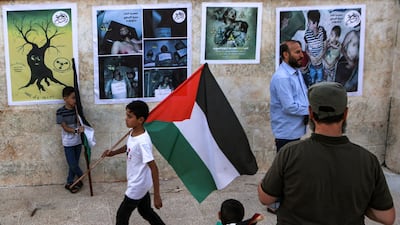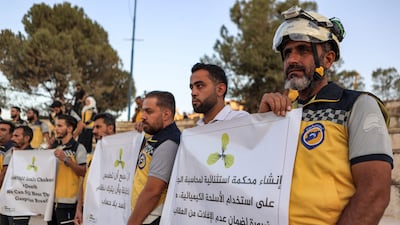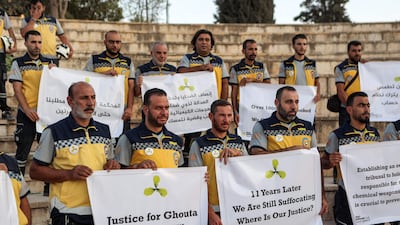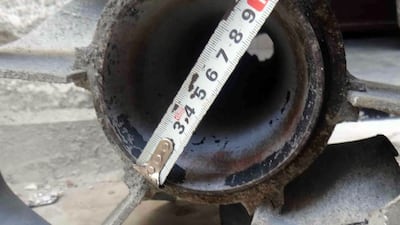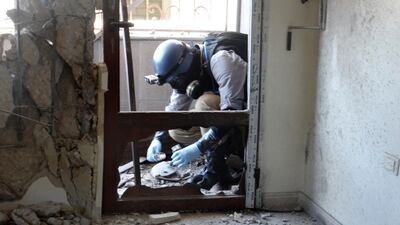It has been 10 years since the Syrian regime was accused of attacking its civilians in the Damascus suburb of Eastern Ghouta with sarin gas.
The lack of international response to that chemical weapons attack has laid the foundation for conflicts unfolding in 2023, experts say.
“The breakdown of the international order truly began in 2013 with President [Barack] Obama’s decision, and the 'bright red line' can now be redefined as that running from the Ghouta attack to the invasion of Ukraine,” James Jeffrey, former US deputy national security adviser, told The National.
“From the perspective of 2023, the war in Ukraine and the threats to Taiwan, the significance of Assad’s 2013 chemical weapons attack on civilians at Ghouta looms ever larger."
On August 21, 2013, the Assad regime attacked Ghouta residents at about 2am, a moment experts say was intended to inflict “the maximum number of casualties” as most slept in their homes.
The attack killed 1,400 men, women and children. A White House report asserted “with high confidence” that the government of President Bashar Al Assad was responsible, and a UN investigation concluded the regime had used sarin gas, a highly toxic nerve agent.
The chemical weapons use has been described as constituting a war crime, as defined by international agreements.
It tested the West, including Mr Obama, who just a year earlier said Mr Al Assad’s potential use of chemical weapons would be “a red line” with “enormous consequences” on American military intervention in Syria’s civil war.
But the UN mechanism to respond failed as an Assad-allied Russia vetoed it, amid claims from Moscow's Foreign Minister Sergey Lavrov that the Syrian opposition carried out the attacks as a “provocation”.
Officials in Washington would later describe how Mr Obama “blinked” on plans for military retaliation, and “was looking for a way to not have to make good on the threat that he had made", retired Col Andrew Bacevich told American media in 2015.
Mr Jeffrey is chairman of the Wilson Centre's Middle East Programme and also former special representative for Syria engagement, and special envoy to the Global Coalition to Defeat ISIS.
He said the lack of response “signalled to global and regional opponents … Russia and China, Iran and North Korea respectively, that the strongest military powers in the West were not willing to use military force to preserve global collective security".
Some experts have used Syria as an example for Russian President Vladimir Putin's potential calculus in the run-up to his invasion of Ukraine in February 2022.
“Already, chilling parallels are evident between Moscow’s prosecution of the Syrian conflict and its current conduct in its Eastern European neighbour,” said the US Institute of Peace in its analysis of the Ukraine war in 2022.
Mouaz Moustafa, director of the Washington-based Syrian Emergency Task Force, told The National: “The world has learnt that 'never again' remains more of a slogan than a reality.”
Maimouna AlAmmar, a survivor of the series of regime chemical weapons attacks that followed, said on Monday that inaction from the West intensified Syrian suffering at the hands of the regime.
Ms AlAmmar told an anniversary event hosted by the American Coalition for Syria (ACS) that it encouraged Mr Al Assad "to repeat chemical attacks dozens of times after that, claiming more lives and breaking more souls".
The video and picture evidence that emerged from the Eastern Ghouta attack, including of pale babies and families foaming at the mouth and suffering violent convulsions, provided some of the most horrific images that would define the brutality of the enduring Syrian civil war.
US President Joe Biden's administration said on Monday that those images “still haunt us to this day, and they drive this administration’s efforts to rid the world of chemical weapons".
A decade later, officials in both Washington and London assert that the international work towards accountability is enduring, albeit it “slow, behind the scenes and bureaucratic,” said Ann Snow, the UK's representative for Syria, at the ACS event on Monday.
The intergovernmental Organisation for the Prohibition of Chemical Weapons is centring its focus, she said, on “building up the evidence for cases, ensuring that there are watertight cases” for international courts to bring Eastern Ghouta's perpetrators to justice.
US director of Levant affairs Steven Butler agreed, and pointed to the US sanctions regime and Mr Biden's signing of the Justice for Victims of War Crimes Act, which enables the prosecution of war criminals in the UN regardless of the offender's or victim's nationality.
Mr Moustafa said the Biden administration still “isn't doing enough” to make the world safer for Syrians.
“Literally today, Idlib was bombed by Russia, Iran and the Assad regime,” he told The National.
“Syria is where the worst crimes of the 21st century have happened … the Biden administration should look at both [Ukrainian and Syrian] conflicts at the same level.”
